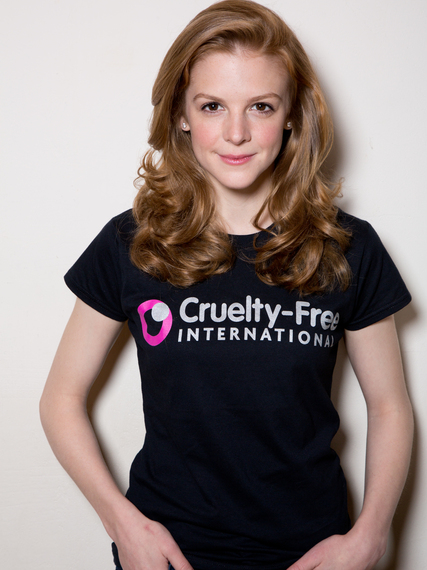Ashely Bell who enchanted -- and terrified -- audiences with her performance as "Nell" in The Last Exorcism and The Last Exorcism Part II has joined forces with Cruelty Free International to stand against the real-life horror of animal testing for cosmetics.
Ashley says,
In this day and age, it's unconscionable that animals are forced to suffer for beauty products here in the U.S. I make the right choice, the humane choice, and only use cosmetics that are not tested on animals. I'm happy to support the great work of Cruelty Free International; the organization committed to ending cosmetic animal testing in the U.S. Europe has already established a groundbreaking change for animals by banning these cruel tests. It is now time for the U.S. to do the same.
It has been estimated that the average woman will spend $15,000 on makeup in her lifetime. The reasons women purchase one brand over another is of huge interest in the cosmetics industry -- they go to great lengths to influence those decisions and often use celebrities to do it.
How fortunate we are that some compassionate celebrities use their fame to promote cruelty free cosmetics. Cruelty Free International is thrilled to have celebrities like Ashely Bell, Norman Reedus, Joss Stone, Paul McCartney, Peter Dinklage and Ricky Gervis to help influence consumers and the industry to reject animal testing for cosmetics.
Of course celebrities are not alone in their concern about animals testing. Indeed multiple polls reveal that the public cares deeply about this issue and wants cruelty free cosmetics.
For example, the 2013 Gallup Values and Beliefs poll revealed that across all age groups the public is increasingly uncomfortable with animal testing. The poll, which is conducted annually to measure Americans' views toward a number of moral issues, revealed the only issue for which acceptance has significantly declined is attitudes toward animal testing. The shift concentrated among those aged 18 to 34 for whom support for medical testing on animals has dropped by 18 points over the past 12 years.
It is important to point out that the Gallup Values and Beliefs poll asks about the acceptability of medical testing on animals. The poll does not ask for opinions about testing cosmetics on animals. However due to the non-essential nature of cosmetics products it is reasonable to assume that those who are uneasy about medical testing on animals would feel similarly or even more strongly about cosmetics testing. Let's face it, while to some a long- lasting deodorant might be characterized as a "lifesaver" nobody could argue that anyone's life has ever actually been saved by deodorant. And, of course, there are plenty of well -established ways to ensure product safety without using live animals.
It is an unfortunate fact that an individual's values do not always correlate with his or her actions -- this is sometimes called a "value-action gap." However, a survey by the Humane Research Council demonstrates that the public not only values the idea of not testing products on animals, but that value translates into consumer action. The 2011 Humane Research Council survey found that 32 percent of respondents said they had purchased products labeled as "not tested on animals" because of their concern for animals.
Other research also suggests that such conscientious purchases have a snowball effect as consumers -- especially women -- promote products that support their ethics to their friends. A 2009 Barkley/PRWeek PR Cause Survey found that two of three women have purchased a brand because it supports a cause they believe in, and three of four have recommended a brand to others for the same reason.
Way to harness consumer girl power!
Whether we like it or not, consumerism shapes many aspects of our society -- from the food, clothing, and household products we buy, to the entertainment venues we patronize. After all, Webster's Dictionary defines "consumerism" as "the promotion of the consumer's interests." Put a little differently, the way we spend our money communicates our beliefs, values, and interests.
It is important to note that just because a product label says "Not Tested on Animals" or "Cruelty Free," it does not necessarily mean that the ingredients were not tested -- it might only mean that the final product wasn't tested. Most animal testing occurs at the ingredient level, so unless a company has verified that level of testing, it's hard to be sure what animal testing did or did not occur in the development of a product. This is why it's important to look for the "leaping bunny." The Leaping Bunny certification is the only international standard that ensures that both products and ingredients did not involve new animal testing,
With informed compassionate consumers and incredible celebrity supporters like Ashely Bell, we can send a clear message to the cosmetics industry that horrific animal tests need to be exorcised.

